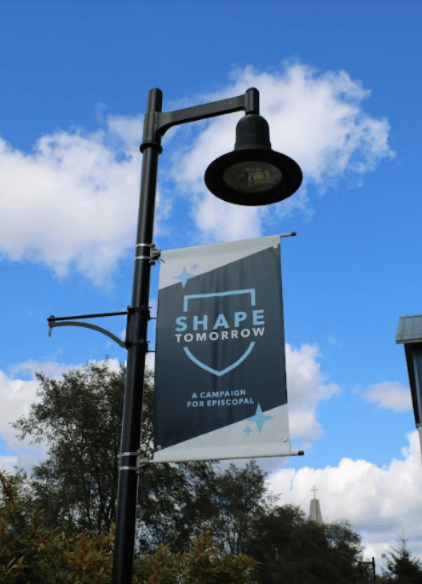Nayan Shankaran ‘24 | Rohan Dalal ‘25
As EA students entered the campus this year, they noticed new paraphernalia related to EA’s Shape Tomorrow campaign all across campus, which is a sign that the campaign is entering its public phase.
Regarding the focus of Shape Tomorrow, Dr. T.J. Locke, Greville Haslam Head of School, explains, “We decided to really focus on raising money on endowment for the professional growth of our teachers and our leaders, financial aid for students, and endow programs here, so that they would be successful for many years.”
Shape Tomorrow has already received endowments from donors. Regarding the endowments, Lawrence Capuzzi, Chief Financial Officer, explains, “It is basically money that comes to the school that we invest and then we draw off it. As of June, we have raised $61 million.”
This increased endowment will allow EA to provide academic and athletic opportunities to students without using their tuition money, which enables EA to provide more scholarships to its students. “When we’re in the admissions office deciding who gets to come to Episcopal, what we’re not talking about is [if they] can afford it,” declares Locke, “We want this to be a school full of students that are amazing. They’re hardworking, they’re smart, they’re kids of character. It shouldn’t be based on [if] they can afford to come.” Jennifer Fifer, the Director of Institutional Advancement, echoes Locke’s belief that financial aid is a major goal of EA’s campaign, stating, “We need to look at the inside to ensure that we’re able to admit the best and brightest students.”
Prior to this school year, Shape Tomorrow was still in its quiet phase, which lasted for 10 years. During its quiet phase, Shape Tomorrow was not being publicized, as EA was wrapping up its previous campaign, Ever Episcopal, which was a capital campaign to help move EA to its new campus. Capuzzi explains that capital campaigns occur when “you want to build things around your campus.”
During Shape Tomorrow’s quiet phase, only the Advancement Office had knowledge of the campaign. As a result, Andrea Yu, Upper School Librarian, says that she “first heard about the Shape Tomorrow campaign from our opening days as faculty and staff” during a meeting which occurred just before the start of this school year. She also mentions that the purpose of the campaign was not revealed to her. Additionally, Noah Rossin ‘23 states, “I don’t know what [the campaign] is because EA has not really advertised it to us. EA shows us things but doesn’t necessarily tell us what they are.”

Photo Courtesy of Gianna Trala ’23
Now that the Advancement team is ready to publicize the campaign, EA has hung up banners with the words Shape Tomorrow throughout the campus and has distributed Shape Tomorrow-themed pens, t-shirts, and stickers. Regarding the purpose of these banners, Locke says, “There should be an element of joy to this [campaign]. There should be a celebration. In one way it’s about raising money, but it’s also about celebrating all the great, generous philanthropy that people committed to.” Aside from being “another way to reinforce that Shape Tomorrow is our primary focus this year,” Fifer believes that “having banners on campus like that, it’s just a very sophisticated, classy, punchy way to celebrate who EA is.”
Although Fifer believes that “a capital building campaign is a little bit easier to raise funds for because it’s so tangible,” a donation to Shape Tomorrow will benefit EA long term by bolstering its financial aid and teacher development programs. Locke believes this is the best way to support EA moving forward. “Over decades, you’re going to affect so many kids forever. The exciting part is that it’s forever,” says Locke.
School administrators have deliberated over the name of EA’s campaign since the campaign’s inception. “The original [campaign] was called Inspire. We wanted something a little bit bolder,” comments Capuzzi. After a meeting among school administrators, including Locke and Fifer, EA settled on the name Shape Tomorrow which represents how EA looks to develop their students to become leaders in the real world. Locke says, “By working with amazing kids and by working with amazing teachers, we talk about the power of coming to school with people you learn with and learn from. When that happens, we really believe that we’re shaping the leaders of tomorrow.”